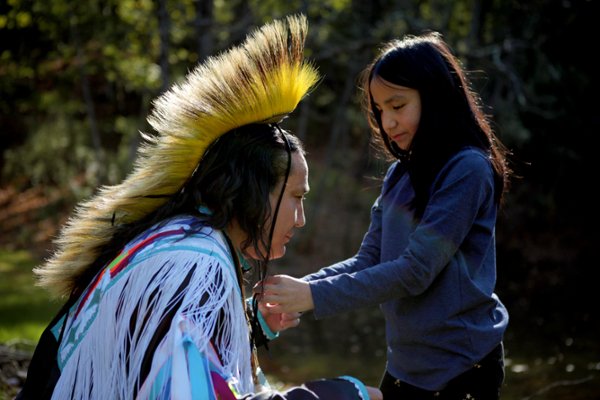RTF’s Olshefski to premiere “Without Arrows” at Big Sky Documentary Film Festival
RTF’s Olshefski to premiere “Without Arrows” at Big Sky Documentary Film Festival

For 13 years, Jonathan Olshefski became so enmeshed in the daily lives of the Fiddler family, Native Americans with the Lakota Sioux Nation in South Dakota, that his camera became virtually invisible, capturing moments large and small.
A professor in Rowan University’s Department of Radio, Television & Film, Olshefski this month premieres the product of all that filming, “Without Arrows,” at Montana’s Big Sky Documentary Film Festival.
“We pitched them a few years ago so it’s really cool to come back with a finished film,” Olshefski said of the film, a multi-generational story about the Fiddlers, ahead of the premiere. “It feels like we’re coming home, back to the plains, back to Big Sky.”
Olshefski sought to tell a personal story about the Fiddlers but also one that is universal – about family, love, the rhythm of life – set amid the daily joys and sorrows of the reservation.
Employing the cinema verité style of filmmaking that he used in 2017’s “QUEST,” his award-winning, debut feature-length film about a North Philadelphia family, Olshefski said the technique enables him to get close to his protagonists to tell a rich, layered story.
“Without Arrows” tells the story of Delwin Fiddler Jr., his parents, his siblings and their children. Olshefski met Fiddler, a master of the Native American art of grass dancing, when Fiddler, then living in Philadelphia, participated in a program about Native American representation in media that Olshefski hosted. Over time, the two began working on a film about Fiddler and his family.
“Without Arrows” is set between Philadelphia and South Dakota, where Fiddler returned to live.
Like many filmmakers, Olshefski seeks will promote his film on the festival circuit as he searches for a distributor who can bring it to wider audiences. Meanwhile, he’s contracted with the PBS program “Independent Lens” to bring “Without Arrows” to public television viewers.
“For now, we just want to get the film out in the world, get it in a room full of strangers and see how it plays,” said Olshefski, who teaches New Media and documentary filmmaking in Rowan’s Ric Edelman College of Communication & Creative Arts.
Grass dancing and other Native cultural elements
Olshefski noted that the Fiddlers are a “powwow family,” and that Delwin grew up dancing and travelling across the country to compete in powwows, traditional gatherings that feature singing, dancing and food.
“Powwows are like a big community party,” he said. “Delwin is a champion grass dancer, which dates to pre-colonial times. When the men were travelling, following the buffalo, they’d stomp down the grass to create their camp and grass dancing stems from that.”
Olshefski co-directed and co-produced the film with Elizabeth Day, a Native American filmmaker based in Minneapolis. He also hired two former students, Niko Ioannou and Gabby Connelly, to help with editing.
Day, one of several Native American filmmakers on the project, said perhaps the greatest challenge in making the film was paring down more than a dozen years of footage to under 100 minutes and a key goal was always to present an authentic Native American story.
“There are a lot of parallels that resonate throughout Indian country that the Fiddlers experience,” said Day. “Some of it is humor and the use of humor. Comedy is huge in native culture.”
She said the Fiddlers’ experience, including Delwin Fiddler Jr.’s initial decision to leave the reservation and move east, in some ways represents that of many native people.
“We touch the theme of finding home, finding a place of belonging,” Day said.
Perhaps most important, she said, are the themes of resistance and resilience, that despite hundreds of years of oppression and relocation, Native Americans “are still here, we’re still alive and we’re thriving.”
With a running time of 95 minutes, the film will screen at the Big Sky festival on Sunday, Feb. 18.